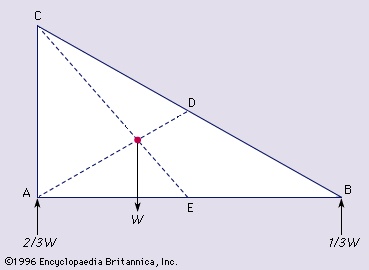gravity, centre of
physics
in physics, imaginary point in a body of matter where, for convenience in certain calculations, the total weight of the body may be thought to be concentrated. The concept is sometimes useful in designing static structures (e.g., buildings and bridges) or in predicting the behaviour of a moving body when it is acted on by gravity.
In a uniform gravitational field the centre of gravity is identical to the centre of mass, a term preferred by physicists. The two do not always coincide, however. For example, the Moon's (Moon) centre of mass is very close to its geometric centre (it is not exact because the Moon is not a perfect uniform sphere), but its centre of gravity is slightly displaced toward the Earth because of the stronger gravitational force on the Moon's near side.
The location of a body's centre of gravity may coincide with the geometric centre of the body, especially in a symmetrically shaped object composed of homogeneous material. An asymmetrical object composed of a variety of materials with different masses, however, is likely to have a centre of gravity located at some distance from its geometric centre. In some cases, such as hollow bodies or irregularly shaped objects, the centre of gravity (or centre of mass) may occur in space at a point external to the physical material—e.g., in the centre of a tennis ball or between the legs of a chair.
 Published tables and handbooks list the centres of gravity for most common geometric shapes. For a triangular metal plate such as that depicted in the figure-->
Published tables and handbooks list the centres of gravity for most common geometric shapes. For a triangular metal plate such as that depicted in the figure--> , the calculation would involve a summation of the moments of the weights of all the particles that make up the metal plate about point A. By equating this sum to the plate's weight W, multiplied by the unknown distance from the centre of gravity G to AC, the position of G relative to AC can be determined. The summation of the moments can be obtained easily and precisely by means of integral calculus.
, the calculation would involve a summation of the moments of the weights of all the particles that make up the metal plate about point A. By equating this sum to the plate's weight W, multiplied by the unknown distance from the centre of gravity G to AC, the position of G relative to AC can be determined. The summation of the moments can be obtained easily and precisely by means of integral calculus.The centre of gravity of any body can also be determined by a simple physical procedure. When an object is suspended from any single point, its centre of gravity lies directly beneath that point.
- John Taverner
- John Taylor
- John Thaddeus Delane
- John the Apostle, Saint
- John the Baptist, Saint
- John, the Elder Wood
- John the Faster, Saint
- John, the Younger Wood
- John Thomas Whitehead Mitchell
- John Thorp
- John Thurloe
- John Tiptoft, 1st Earl of Worcester
- John Tiptoft Worcester, 1st Earl of
- John T McCutcheon
- John Toland
- John Torrey
- John Tradescant
- John Trumbull
- John Turberville Needham
- John Tyler
- John Tyler: Dorr's Rebellion
- John Tyndall
- John Tzetzes
- John Ulric Nef
- John Updike